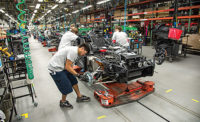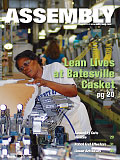
Few things in life are certain, except for death and taxes. That’s good news for assemblers at Batesville Casket Co.’s Manchester, TN, plant. Every day, they build more than 1,000 burial caskets on a flexible assembly line.
The 39-year-old plant is located in southern Tennessee, halfway between Nashville and Chattanooga. Assemblers mass-produce 18- and 20-gauge steel caskets with an endless variety of options and features. In fact, more than 70 percent of the products built at Batesville Manchester are personalized and built to order.
Caskets are available with numerous options, such as 22 exterior colors and seven interior fabric colors, in addition to many different types of exterior hardware, such as handles, swing arms and decorative corner accents. Assemblers also produce caskets that feature either full tops or cut tops and caskets equipped with or without gaskets.
By implementing lean manufacturing initiatives, the 450,000-square-foot plant has streamlined its operations. Assemblers use continuous improvement activities and lean tools to identify and eliminate waste in the production process.
Cost per unit has dropped 24.3 percent since Batesville Manchester went lean 14 years ago. Floor space has been reduced by more than 50 percent, creating room for new initiatives. During the last three years alone, the plant has reduced its costs by 3 percent above inflation.
“Continuous improvement is a way of life for the Manchester team,” says Mary Jo Cartwright, director of operations. “We use many lean tools, including kaizen events and value stream mapping, to ensure that we continue to push our performance and process to the next level.
“Our lean journey will never end,” Cartwright points out. “As Ken Camp, our president and CEO, often says, ‘We are frequently pleased, but rarely satisfied in our efforts.’”
“The goal of Batesville Manchester is ‘helping families honor the lives of those they love’ through timely delivery of flawless products with superior value,” adds Cartwright. “We are committed to a dynamic environment of continuous improvement where safety, individual integrity and personal development are recognized as the pillars of our success.”
The plant is also impressive because it’s a vertically integrated operation that produces 98 percent of the 224 parts needed to assemble a typical casket. All metal stamping, plastic injection molding, fabrication and painting is done in-house.
For example, the Manchester plant produces all the rubber gaskets used on its caskets. The on-site rubber molding facility also supplies other Batesville plants. In addition, Batesville Manchester operates an in-house fabric shop where employees cut, stitch, and staple all the material to line the interior of caskets. Even metal bed frames, pillows and cushions are made in-house.
While many manufacturers choose to outsource those processes, “we [prefer to] control our own destiny,” says Cartwright. That’s what sets her facility apart from others. And, it’s one reason why Batesville Manchester is the recipient of the 2009Assembly Plant of the Yearaward sponsored by ASSEMBLY magazine and The Boston Consulting Group Inc. (BCG).
“We are very impressed with the results that Batesville’s Manchester plant has been able to achieve in all dimensions of its operations,” says Michael Zinser, partner in BCG’s Chicago office and a co-leader of its global manufacturing team. “Many organizations promote their lean programs and focus on continuous improvement, but few have been able to generate the consistent improvements in cost, quality and delivery that Batesville has realized. They have been able to integrate operational excellence into the fabric of their culture, which we believe will allow them to maintain a competitive edge in the marketplace in the future, despite the inevitable pressures from low-cost competitors.”
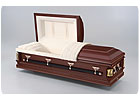
Industry Leader
Batesville is the largest casket manufacturer in the world. It was the first company to develop and mass-produce steel caskets. The 125-year-old company currently builds metal and wood caskets at five plants in the United States and Mexico.Caskets are delivered to more than 16,000 funeral homes daily using Batesville’s own fleet of trucks. Products are available in 27 shapes and 150 color combinations. Thousands of personalization options are available, such as pinstripes and custom embroidering.
Materials include carbon steel, stainless steel, copper, bronze and various hardwoods, such as cherry, maple and oak. Inventory is maintained at more than 80 company-operated customer service centers and six rapid-deployment centers located throughout North America.
Batesville has provided caskets for many U.S. presidents, including Gerald Ford, John F. Kennedy, Ronald Reagan and Harry Truman. Many celebrities, such as Bob Hope, have also been buried in Batesville’s products.
Today’s marketplace is more challenging than when Batesville built the Manchester plant 40 years ago. For instance, back then, no one ever heard of a casket made in China and cremation was something that was often frowned upon.
According to the Casket & Funeral Supply Association of America, imports now make up a rapidly growing portion of the industry. For instance, last year 2.4 percent of all caskets sold in the United States were assembled in China, a fivefold increased over 2003. In the future, those new low-cost competitors will continue to drive additional pricing pressures in an industry that already has approximately double the necessary domestic production capacity.
Shifting demographics is another trend that’s affecting the funeral services industry. Life expectancy rates in the United States have increased steadily since the 1960s and that trend is expected to continue into the foreseeable future. As the population continues to age, the number of deaths will remain relatively flat.
Cremation is also affecting casket production rates. Today, one out of every three Americans chooses to be cremated, and that number is expected to rise to 50 percent within the next two decades. The cremation industry is being driven by issues such as mobility, affordability and ecology.
Batesville has responded to those competitive pressures by developing a line of low-cost generic caskets and by creating a wide array of cremation products, such as containers, urns and memorial vases. Of course, many families still prefer traditional funerals and burial caskets. And, many consumers are looking for more personalization and customization options today.
To meet that demand, Batesville offers a wide range of add-on features. The goal is to give families new ways to add personal touches that make every ceremony a unique celebration of an individual’s life experiences. Customers have numerous choices for creating a personalized funeral experience or sharing a life story.
For instance, they can choose different types of decorative hardware to add to the outside of a casket. Interchangeable LifeSymbols are a popular option. If the deceased person was an avid gardener, there can be an image of a flower pot on the corner of the casket. An eagle and American flag are commonly used for individuals with police, fire or military backgrounds. The popular casket enhancements are also used as individual keepsakes for family and friends.
Commemorative panels and embroidery inserted into the lid of a casket provide a personal way to highlight a loved one’s interests, hobbies or values. Choices include spiritual symbols, organizational emblems, favorite pastimes or special relationships. For example, a football fan can have the inside of his casket adorned with his favorite team’s colors.
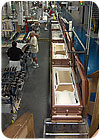
Lean Initiative
To offset Chinese imports, cremation and other challenges, Batesville Manchester has harnessed the power of lean manufacturing. “Foreign and domestic competition has demanded continuous improvement in all areas of the business, including safety, quality, cost and delivery,” says Cartwright. “We have been able to eliminate waste in our process to become a more repeatable and reliable supplier to our customers. We can quickly respond to a customer’s need with the improvements made in our lead times.”By using a high-velocity, mixed-model pull production system, Batesville is able to maintain the lowest inventory level in the casket industry, achieve on-time delivery more than 99 percent of the time and gain a competitive edge in the marketplace.
The company tracks key performance indicators related to cost, delivery, quality and safety on an hourly, daily, monthly, quarterly and annual basis and uses the data to drive fact-based decision making.
The Manchester plant embarked on its lean journey in 1995. Since then, the results have been impressive. Lean manufacturing has helped ensure the viability of a facility that was built during a different manufacturing era.
“We dedicate resources to a strong, active continuous improvement program that includes 5S, kanban systems, visible work instructions, value stream mapping, proactive maintenance management, quality feedback loops, self-directed work teams and an employee suggestion system,” says Cartwright. Those efforts have allowed her plant to post some dramatic improvements in a wide variety of production processes.
For instance, aggressive use of lean tools such as value stream mapping (VSM) has allowed Batesville Manchester to experience a 7.2 percent improvement in hours per unit since the beginning of 2006.
“Through VSM, we identify and improve the waste in our process,” explains Cartwright. “This has reduced the lead time of our supply chain. During the past 10 years, we have seen our hours per unit reduce by 37.9 percent. This has been accomplished over a steady decline each year. We are always looking for ways to reduce inventory and improve process efficiencies so our customers receive product quicker.”
One of the key measures that the plant uses to track delivery is lost cycles as a percentage of total cycles. Batesville Manchester has experienced a steady decline in this measure over the last several years, resulting in a 55 percent improvement from 2007 to 2008.
“If we do not deliver a casket every cycle, then we disappoint a customer, since we build to customer demand,” Cartwright points out. “This is an important measure where all areas, such as safety, quality and downtime, can impact our customer. So, we work together to make improvements and eliminate lost cycles.”
The Manchester plant is Batesville’s leading facility, producing about 42 percent of the company’s products. As a result, several lean initiatives that started in Tennessee have been adopted by other Batesville plants.
“The Manchester plant is further along in our lean journey, but our sister plants are quickly gaining ground,” says Cartwright. “We have been able to share best practices with them, but we are also able to learn from them. We have weekly teleconferences to review performance and share ideas.”
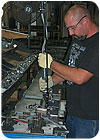
Employee Involvement
Employees have played a key role in the success of the Manchester plant’s lean initiative. The facility’s 370 associates, who work in two shifts, are represented by the United Steelworkers Union.“The operation of the plant begins with assembling a team of talented associates,” says Cartwright, who formerly served as head of human resources. “We are proud to have the best workforce in Tennessee.”
All employees are trained in the fundamental principles of lean manufacturing, which are tailored to fit the unique demands of the casket industry. “Our corporate mission of ‘helping families honor the lives of those they love’ provides the foundation and context for everything we do in Manchester,” says Cartwright.
All employees understand how lean manufacturing works and are committed to plantwide continuous improvement efforts. In fact, an area outside the cafeteria is devoted to a continuous improvement wall.
“The wall was created to give a visual indicator of how we are performing,” says Cartwright. “It is based off our future value stream maps. Elements of our implementation plan for the next 15 months and 90 days are presented on the board. We also display our performance metrics.”
Ideas that are generated by employees are posted on the wall to document and share incremental improvements. In addition, departmental walls located throughout the plant are dedicated to specific focus areas.
“Everyone on the team truly realizes the importance of his or her function and the impact it has on our customers,” adds Cartwright. “We are mindful that our productivity, quality and efficiency translate directly into the value grieving families experience at one of the most difficult times in their lives.”
To address that issue, the 2009Assembly Plant of the Yearuses a world-class quality feedback program. A comment card is inserted into every casket that leaves the factory. If a concern arises, it’s followed up with visits, telephone calls and group discussions to identify what caused the problem.
“Then, we use root cause analysis to determine the source and implement strong countermeasures to address and resolve the issue,” says Rick Ring, quality manager. “We have seen a 40 percent reduction in our customer disappointments in the past three years with this approach.”
Visual inspection also plays a key role in ensuring top-notch quality. The Manchester plant adheres to a “diamond standard.” Every management-level employee is required to inspect two caskets per week which are randomly pulled off the line.
The plant’s quality audit station and database have been adopted by Batesville’s other facilities. “This allows all associates to perform audits of caskets as if we are the customer,” Ring points out. “We capture data and provide feedback to the entire team on the quality being shipped to our customers.”
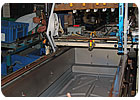
Creativity Before Capital
All employees adhere to the Manchester Guiding Principles to cut costs, improve quality, boost productivity and improve time to market. One of those 10 tenets is “creativity before capital.” According to Todd Howell, engineering manager, that was one of the most significant changes the plant made at the beginning of its lean journey 14 years ago.“We went back to the basic approach that simpler was better,” explains Howell. “We never throw money at a problem until we address it with continuous improvement activities. Many times, improvements can be made simply with creativity. This has helped us avoid spending money unnecessarily on new equipment or expensive solutions.”
To improve performance, Batesville Manchester eliminated unreliable equipment that was difficult to maintain. Some processes and equipment were replaced with simple solutions that were created in-house by employees.
For example, an automatic tape machine was designed and developed by a supervisor. “Manual tape dispensers are mounted to a simple frame,” says Howell. “The machine engages when a casket passes under it on the continuous conveyor. The only expenses were the frame and some programming to time the guns with the casket. This resulted in a big productivity and ergonomic improvement.”
Another example of creativity before capital occurred when the plant needed to replace an unreliable overhead parts conveyor. “The conveyor’s only purpose was to move component parts to operators on the assembly line,” explains Howell. “We began to use the casket as the means to transport parts and removed the overhead conveyor.
“Whenever we’re looking for an in-house solution, we ask: ‘What would Skipper and Gilligan do?’” adds Howell. “We always look at the Gilligan approach first. Those TV castaways survived on a desert island for a long time.”
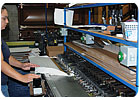
New Technology
Although Batesville Manchester’s lean initiative encourages homegrown tools and techniques, the plant also embraces new technology. It has extensively used technology to improve operations by automating formerly manual tasks or by upgrading existing automation. Technology has come in the form of computers, robotics and associated control systems.A good example is the plant’s Visual Link System. The in-house design, created by a Manchester engineer two years ago, has since been shared with the rest of Batesville’s plants. The paperless work instruction system was inspired by a benchmarking trip to a John Deere plant in Greeneville, TN.
Computer terminals located at workstations throughout the plant tell operators the parts and assembly processes required for the casket entering their work area. The software program uses both color photos and bold text to transmit build specifications and other critical information. It operates off a bar code scan. If operators need more information, they can find details on the computer screen.
“With the increase from a standard set of model options to more of a custom shop strategy, with minor differences between units, it is impossible to memorize each component in each model, even if you’ve worked [here] for more than 20 years, like a lot of our associates have,” says Cartwright.
“We want everyone to tell normal from abnormal,” adds Howell. “Visual management helps error proof assembly processes by visually showing when something is not right. This helps us detect potential mistakes before they occur and prevents mistakes from being passed on to our customers.
“The Visual Link System simplifies the amount of product knowledge necessary to perform an assembly task, increases the accuracy of the installation, and decreases the amount of training necessary for new operators,” explains Howell. “Since the system was installed, the potential for customer disappointments has exponentially increased. At the same time, however, the number of customer disappointments has decreased.”
Robotic technology has also played an important role in the recent success of the 2009Assembly Plant of the Year. Since 2006, 13 robots have been integrated into the Batesville Manchester production line in areas such as the paint shop. The most recent addition is two robots that automatically load and unload parts for a metal stamping press. The six-axis robots replaced obsolete and expensive mechanical arms.
“The new equipment is proving to be as trouble free and reliable as intended,” says Howell. “It is also providing improved quality due to its accurate and repeatable movement.”
“These technological improvements have reduced costs, improved quality and increased our ability to quickly respond to customer demand,” Cartwright points out. “In a competitive business, such as the casket industry, the Manchester plant’s ability to continue to integrate technological improvements will ultimately secure our future.”
Cartwright and her colleagues are currently looking at new types of material loading equipment, welding automation, improved sanding materials and alternative forming operations.

About the Award
The Assembly Plant of the Year award was initiated in 2004 to showcase world-class production facilities in America, and the people, products and processes that make them successful. All manufacturers that assemble products in the United States are invited to nominate their plants.
The Assembly Plant of the Year award is sponsored by ASSEMBLY Magazine and The Boston Consulting Group Inc. (BCG), a global management consulting firm that is the world’s leading advisor on business strategy.
The goal of the Assembly Plant of the Year award is to identify a state-of-the-art facility that has applied world-class processes to reduce production cost, increase productivity, shorten time to market or improve product quality.
An official nomination form appeared on the magazine’s Web site earlier this year. Nominations were received from a diverse group of manufacturers that reflect the magazine’s demographics.
All nominees were evaluated by ASSEMBLY’s editorial staff and by BCG’s operations practice, based on the following criteria:
- Have assembly processes been improved through the use of new technology?
- Has the plant improved its performance by making more effective use of existing technology?
- Has the plant taken steps to reduce production costs?
- Have new or improved assembly processes resulted in increased productivity?
- Has the plant used assembly improvements to reduce time to market?
- Has the plant boosted bottom-line profits and competitive advantage?
- Did operators play a role in the successful implementation of new assembly strategies?
- Has a product been effectively designed for efficient assembly?
- Has the plant attempted to protect the environment and conserve natural resources?
As winner of the sixth annual Assembly Plant of the Year competition, Batesville Casket Co.’s Manchester, TN, facility received an engraved crystal award and a commemorative banner during a special presentation at the plant.
Previous recipients of the Assembly Plant of the Year award were IBM Corp. (Poughkeepsie, NY); Schneider Electric/Square D (Lexington, KY); Lear Corp. (Montgomery, AL); Xerox Corp. (Webster, NY); and Kenworth Truck Co. (Renton, WA).
Nomination forms for the 2010 Assembly Plant of the Year award will be available early next year at www.assemblymag.com.
To find out more about the 2009 Assembly Plant of the Year, click www.assemblymag.com and search for these articles:
- Behind the Scenes at Batesville Manchester.
- Guiding Principles.
- How a Casket Is Assembled.
- Lean and Green.
- Safety First!
- The History of Caskets.

